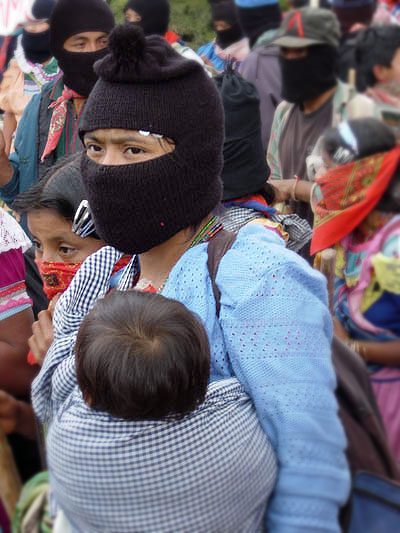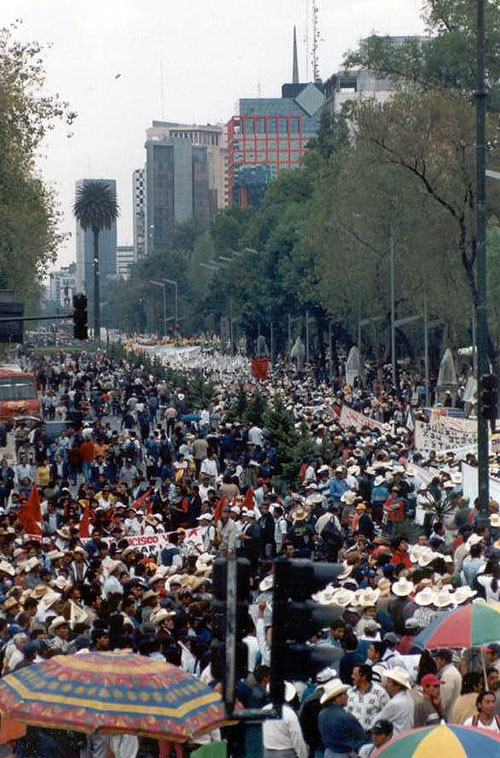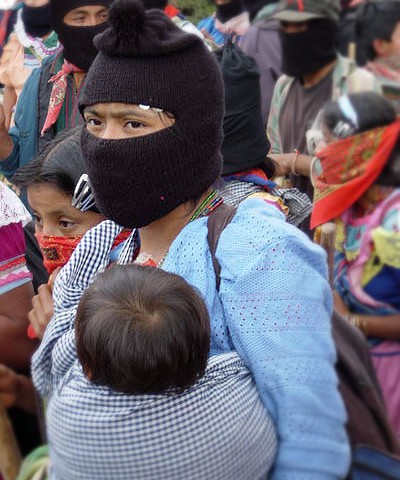
2002
02/01/2003ANALYSIS: Resistance and autonomy, the creation of the zapatista juntas of good government
29/08/2003- In a world of war Constructing spaces for meetings, sharing alternatives
- EZLN: “Another Calendar – A Calendar of Resistance”
- National Meeting Against PROCEDE and PROCECOM
- Second Meeting of Chiapanecans Confronting Neoliberalism
- The First Regional Meeting of Indigenous Tzeltal Women
- Third Meeting on Experiences for Peace and Reconciliation
- “The country won´t take it anymore”
- Promoters of National Unity Against Neoliberalism
- Possibilities and Challenges

The new year dawned on Chiapas with an enormous mobilization of Zapatistas and supporters in the streets of San Cristòbal de las Casas. This demonstration commemorated the ninth anniversary of the Zapatista uprising and put an end to their silence, maintained since the approval of the constitutional reform regarding indigenous people in April 2001. The EZLN affirmed, through communiqués read by primary Commanders, among other things: “The Zapatistas demand recognition through the constitution, of rights, autonomy, and self-determination for all of the indigenous villages of México. We demand to be treated with equality and justice. Therefore, we will not accept deception nor your offerings of pity, crumbs, and trash. [. . .] Because we are villages with a long history, we are prepared to continue our struggle until all indigenous villages in our homeland are respected.” This demonstration is considered the largest public Zapatista demonstration to date.
The Zapatistas have published a series of communiqués designated “Esteles” (a monument in the form of a headstone or pedestal that includes a commemorative inscription) one for each month of the year, each one dedicated to a state in México. With these Esteles, the EZLN has created “Another Calendar: The Calendar of Resistance“, narrating the history of an “underground México that struggles and resists.”
The Esteles of the calendar review past and present struggles in different places. Among others, they mention: the struggle against the privatization of Monte Albán, an archeological zone in Oaxaca; the campesino opposition to the expropriation of land for the construction of the Puebla-Tecamachalco freeway and Millenium Park in Puebla; the defensive measures of indigenous groups in la Huasteca and the young people’s group banda y punks in Pachuca, Hidalgo; the reconstruction of communal autonomy for different villages that inhabit the northern-pacific region; the reestablishment of the Purépecha Nation or the movement for the defense of traditional medicine in Michoacán; and the success of the campesino movement in San Slavador Atenco, which, through organizing and protests, halted the construction of a new airport on campesino lands near México City.
All of the accounts in the calendar are stories of resistance against the stripping of land by commercial interests and ultimately represent the indigenous struggle for respect for their cultures, identities, and the lands which they inhabit. The Esteles indicate that popular demands for the construction of a different México stem not only from Chiapas, but are indeed national in character: “This is the inception of a movement with multiple faces, a movement that is political but without parties, a movement that spreads over a large territory and is supported by other movements, a movement whose expression is one of collective and individual resistance, a movement that is still invisible.” (Northern-Pacific Region, Eigth Wake).
During the first months of 2003, both in Chiapas and at the national level, spaces have been created for sharing and understanding concrete experiences of resistance against government programs and free trade agreements, which are viewed by indigenous villages as threats to their territory and natural resources.
National Meeting Against PROCEDE and PROCECOM
“To work for the reconstitution of the community. To strengthen collective and communal work; to search for remedies to divisions within communities; to achieve unity in our struggle while respecting civil, social, and political differences; to dialogue amongst ourselves, to unite ourselves as indigenous people and campesinos.”
(Accords of the Meeting)
On February 5 and 6, the city of San Felipe Ecatepec, Chiapas, hosted the National Meeting Against the Certification Program for Ejido Rights (PROCEDE) and Communal Rights (PROCECOM) under the slogan: “After a decade of agrarian counter-reform, We Are Defending Our Land.”
The objective of the meeting was to analyze the different experiences of indigenous villages and campesinos under the federal government programs that certify communal property; understand the programs´ repercussions; and formulate judicial, political, and social strategies against the programs. The meeting was called by centers for human rights and social organizations from Chiapas, Veracruz, and Oaxaca, but accounts of struggles came from other Mexican states, including Querétaro, Puebla, Jalisco, México City, Tabasco, and Guerrero.
PROCEDE was discussed as an instrument of neoliberal economic policies—relating to the reform of article 27 of the Mexican Constitution (1) and the enforcement of the North American Free Trade Agreement (NAFTA) (2)) – which aim to facilitate the privatization of communal property. Participants discussed different strategies utilized by the government to enforce PROCEDE, including deception and blackmail used by salespeople representing agricultural companies.
Participants also affirmed that PROCEDE is contributing to divisions within communities between those who do and do not accept its implications. They analyzed the most profound impacts that these programs have on indigenous cultures and communities, since the loss of land compromises food security and the recognition of indigenous autonomy.
In addition, participants vowed to “[W]ork for autonomy and fight for the completion of the San Andres Accords, especially for the rights of self-determination and territory, driving the political and cultural resistance against PROCEDE and PROCECOM through respect for our customs; the establishment of our own community authorities and by-laws; the use of indigenous languages in ejido assemblies and communities; as well as the establishment of rules for co-existence which defend our right to protect our land.”
(1) 1992 marked the end of land distribution and the reform of article 27 of the Mexican Constitution, eliminating the established prohibition of privatizing communal lands. From this point on, every communal land owner has had the option of selling his parcel of land. From the point of view of most analysts, the reform of this article intended to open communal landholdings to the free market. ^
(2) Enforcement of NAFTA began on January 1, 1994 and is considered one of the causes for the EZLN uprising that took place on the same day. After nine years of NAFTA, the outcome for Mexican campesinos are negative sales, since they can no longer compete with products from the United States which are subsidized by the US government. Results include abandonment of the cultivation of numerous crops, storage of grains that cannot be placed on national and international markets, and the disappearance of numerous small and mid-sized producers. ^
Second Meeting of Chiapanecans Confronting Neoliberalism
“To strengthen resistance and search for alternatives”
(Objectives of the Meeting)
The policies that form the foundations of PROCEDE and PROCECOM were analyzed more broadly in the Second Meeting of Chiapanecans Confronting Neoliberalism. The first meeting took place in October of 2002 in San Cristóbal de las Casas, where it was agreed to meet a second time in the community of Nuevo Hixtán (located in a region threatened by the construction of a dam). Fifteen workshops were offered based on the following themes: PROCEDE, Dams, Plan Puebla-Panamá (PPP), Coffee, World Trade Organization-Free Trade Area of the Americas (OMC-ALCA), Women, Militarization, Biodiversity, Food Security, Human Rights, Corn, Fair Trade, Genetically Modified Foods, Agri-toxins, and Community Division and Neoliberal Plans (this last workshop was facilitated by SIPAZ and Alianza Cívica).
In this workshop a participant shared with us the following reflection: “We don´t know where the problem comes from. When a project comes to the community, hatreds flare because there are some who benefit more than others. And I don´t think that we are at fault. Those at fault are the ones who impose upon us from above so that we fight amongst ourselves, so that we lack unity. This hate and envy that we are sewing, how can we get rid of it? The hatred between campesinos doesn´t make sense because we are brothers. The women who participate in [the program] “Oportunidades” [*] fight amongst each other. These are the problems imposed upon us by neoliberalism.”
A large portion of participants attended the workshop on dams. They noted that one of the strategies of PPP is to construct hydroelectric dams across the state of Chiapas. This strategy entails, in the first place, the inevitable dislocation of those who inhabit territories affected by the dams, resulting in social, cultural, and environmental consequences for said communities.
Meeting participants—who came from more than 30 Chiapanecan municipalities—declared themselves against PPP, hydroelectric dams, the Free Trade Area of the Americas, and state militarization. They renounced the Bush administration´s imperialist war against Chiapanecan villages. They called for all to work together for lives of peace, justice, and dignity, to defend the seeds of identity, recognizing collective labor as a viable alternative for villages. Finally, they agreed to undertake joint actions of resistance and agreed to support the agenda of demonstrations for the year:
- March 8: International Women´s Day
- March 14: World Day Against Dams
- April 10: Anniversary of the death of Zapata and commencement of the Continental Week Against Genetically Modified Foods
- May 5-9: First Hemispheric Forum on Militarization (San Cristóbal de las Casas, Chiapas)
- May 16-18: First National Meeting of Mesoamerican Resistance and Response to Neoliberal Globalization (San Juan Guichicovi, Oaxaca)
- July: Formus Against PPP and Dams, in Favor of Biodiversity and Culture (Honduras)
- August 14-16: Forum on Autonomy (organized by la Red por la Paz, in Chiapas)
- October 12: Commencement of the International Campaign for Mobilization and Protest
[*] ¨Oportunidades¨ is the government program directed toward indigenous women, formerly known as PROGRESA, through which women recieve small sums of money, dependent upon children attending school and receiving medical check-ups. (Return)
The First Regional Meeting of Indigenous Tzeltal Women
“To reflect on the problems of women on the national, state, and community levels that stem from neoliberal policies; to look for and construct new coordinated efforts that strengthen our organizing work and our proposals in social, economic, and political fields”
Coinciding with International Women´s Day, the First Regional Meeting of Indigenous Tzeltal Women took place in Ocosingo. Using gender analysis, participants articulated the consequences of neoliberal projects and vocalized the necessity to create alternatives. Participants concluded five months of reflection in the following areas: social rights, economic rights, cultural rights, political rights, and reconciliation and peace.
Participants affirmed the necessity to overcome conflicts that exist between different indigenous and campesina organizations in the region, as well as look for ways to dialogue with co-workers and share objectives through these organizations. More concretely, participants agreed to write a letter to Comandanta Esther, to share their experiences with her and other Zapatista women.
Participants felt a strong sense of unity with both Mexican and international communities of women, sharing experiences and stuggling together against the government´s neoliberal projects.
Third Meeting on Experiences for Peace and Reconciliation
“We are moving from diversity toward unity, respecting each other´s ideas aiming to create bridges that will lead us together toward justice, dignity, and peace, because another world is possible.”
(Final Declaration of the Meeting)
At the end of January, the Third Meeting on Experiences for Peace and Reconciliation took place, organized by la Red por la Paz, Chiapas(4). The meeting included 180 people from six regions of the state: Northern, Jungle, Highlands, Central Valleys, Border, and Frailesca. Participants analyzed the main conflicts experienced in communities and defined joint actions to resolve conflicts.
Participants identified a number of fundamental problems in communities: militarization, alcoholism, and divisions among groups of different political and religious backgrounds. They identified as causes programs implemented by state and federal governments, free trade agreements, and the neoliberal economic project PPP.
The Meeting determined a plan of action, designated an interregional team to plan the next meeting, and produced a call to all villages: “We take into account and respect all individuals, groups, and communities, as well as customs. We look for mutual respect and resolve our communities´ problems through dialogue. We are united to confront the problems that affect us: agrarian conflicts, dislocations, and community divisions.”
(4) La Red por la Paz (Network for Peace) provides space for action and reflection for organizations and aims to support peace and reconciliation processes for organizations and communities in Chiapas. Members of la Red, among other institutions, include: Alianza Cívica-Chiapas, CORECO, Cáritas, SIPAZ, CIEPAC, CEPAZ, DESMI, EDUPAZ, Enlace, Comunicación y Capacitación, los Centros de DDHH Fray Bartolomé de las Casas, y Fray Pedro Lorenzo de la Nada, etc. ^

In the past six months, we have seen the campesino movement against NAFTA grow to the national level. On November 12, 2002, twelve regional and national campesino organizations issued the manifesto “The Country Won´t Take It Anymore: Six Proposals for the Rescue and Restoration of the Mexican Countryside.” The manifesto repudiates the enforcement of a new section of the agrarian chapter of NAFTA (beginning January 1, 2003), which reduces tariffs on agricultural imports from the United States apart from corn, beans, powdered milk, and sugar cane.
The movement demands, among other things: the renegotiation of the agrarian chapter of NAFTA; a long-term plan for the years 2003-2020 that suggests structural reforms for the agricultural sector; an increase in the state budget from 0.6% to 1% of the GDP for rural development; food quality and security for Mexican consumers; and the completion of the San Ándres Accords in the matters of rights and culture in indigenous villages.
On the January 1, coinciding with the Zapatista mobilization in Chiapas, individuals from all over the country allied with The Country Won´t Take It Anymore, filled the Zócalo in México City in the largest national campesino demonstration since the administration of Lázaro Cárdenas. In the past months, by means of sit-ins, hunger strikes, and demonstrations, campesinos have forced the federal government to open a dialogue with the objective of reaching a National Accord for the Countryside.
At present, meetings are taking place between campesino organizations and government officials. While the two sides have established consensus in some areas, there remain strong disagreements relating to NAFTA, the state of emergency in the Mexican countryside, and campesino access to the Mexican Institute for Social Security.
Approximately 400 social organizations, including members of the National Workers´ Union (UNT), The country won´t take it anymore, the Permanent Agrarian Congress (CAP), and El Barzón, created the Campesino and Civil Union Front (FSCS). The purpose of this coalition is to unify and strengthen the struggle for a more just national development plan, for labor reform that favors workers, and for a new national accord for the countryside against the privatization of energy.
Promoters of National Unity Against Neoliberalism
“Our villages are struggling against a neoliberalism that from its beginning has been a war against humanity. Those in power know full well that they are selling us a model that claims to be the best product for all humanity. Today, the whole world is organizing itself to fight against neoliberal policies, not only in favor of peace but in favor of alternative projects for a true democracy with justice and liberty.”
(Pablo González Casanova)
The reactivation of social movements across México against neoliberal policies promoted by the Mexican government in the areas of privatization, fiscal reform, labor reform, and free trade, has prompted the creation of Promoters of National Unity Against Neoliberalism. Its objective is to create a meeting space for distinct struggles, with the end goal of articulating a common agenda.
The movement—whose coalition includes intellectuals, NGOs, unions, and diverse social organizations—held its first forum at the beginning of March in México City, and had the following objective: “to open discussion and initiate promotional actions in different states and sectors; and by these means coordinate with civil leaders and laborers working in the fields of policy and social justice.”
In this forum, Pabolo González Casanova (exrector of the National Autonomous University of México, UNAM) made clear that “we don´t want to be the vanguard nor direct or head all organizations. We aim at all times to give respect to the autonomy of each organization; to uphold, even in the most difficult moments, our respect for all ideologies, religions, and political positions; not engage in electoral politics; fight against terrorism; avenge the state of its enemies; and increase solidarity across the nation, in Latin America, and the world.” (La Jornada, March 7, 2003)
Possibilities and Challenges
“As campesinos we can say: we are poor; this is our fault; we are on land that produces little. But if someone arrives who is more shrewd, he casts his line, and we are all fish. And it is easy for him because we are hungry and we would sell ourselves for a calf. […] I think that the government is covering our eyes, ears, and mouths. But what are we going to do? Unite ourselves and with force move this boulder that is blocking our path.”
(Participant in the workshop about Community Divisions, in Nuevo Huixtan)
Moving the boulder that is neoliberal globalization—which includes militarization, expressed currently by the war and militarization of strategic regions—is the common objective of Zapatista strategy and the numerous meetings at the local and national levels. Along with the expansion of neoliberal and warmongering policies, there grows in Chiapas an awareness that it is essential to create an alternative to today´s dominant model, to guarantee the creation of a lasting, sustainable peace, with social justice and respect for individual and collective human rights.
Nine years after the enforcement of NAFTA and the Zapatista uprising, individuals and organizations are confronting neoliberal projects imposed in Chiapas and all of México through the vehicles of civil society, politics, and culture. The country of México is in harmony with continental and global agendas epitomized by “the spring of Porto Alegre.”
Within the process of coming together, one of the greatest challenges will be uniting distinct movements under common objectives, with each movement rising above differences while maintaining individuality. We can all travel the same road while discovering that there are multiple ways of traveling it.


